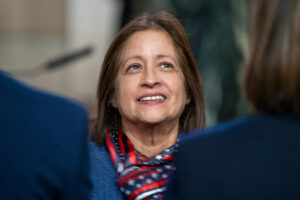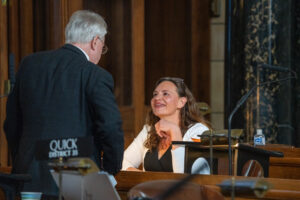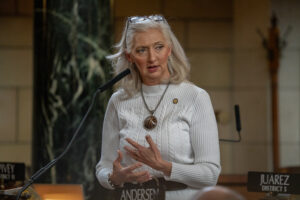LINCOLN — State lawmakers are one debate away from adopting two bills backed by Nebraska Gov. Jim Pillen meant to increase online safety for minors and curb student phone use at school.
Senators on Wednesday, by voice vote, advanced Legislative Bill 504, the “Age-Appropriate Online Design Code Act” by State Sen. Carolyn Bosn of Lincoln. It would require online services to explicitly protect minor users and their personal information in the physical design of certain applications or websites, including social media.
LB 504’s goal is to tackle rising youth social media use and harms such as depression, anxiety, eating disorders, bullying, harassment, stalking, suicide and more.

Bosn, a former deputy county attorney in Lancaster and Saunders Counties and a mother of four young children, said the online services covered under her bill profit off of users’ data, including from screen time, clicks or purchases. She added that families know the importance of bills such as LB 504 and how difficult it is to stay ahead of an “ever-changing online world.”
The bill is about public safety, Bosn explained, comparable to car seats, toddler beds, training wheels, helmets and high chairs.
“We think about safety features in every other product we provide to our most vulnerable,” Bosn said. “So why wouldn’t we make every effort to make kids online safer?”
Specifics of the bill
Under LB 504, “qualified online services” are those that:
- Conduct business in Nebraska.
- Determine the purposes and means of processing users’ personal information.
- Have annual gross revenue over $25 million, adjusted every other year for inflation, at least 50% of which is derived from the sale or sharing of personal user data.
- Buy, receive, sell or share the personal information of 50,000 or more consumers, households or devices each year.
Online services with “actual knowledge” that fewer than 2% of users are minors (up to age 18) would be excluded from the act, as would federal, state, tribal or local governments for design features “in the ordinary course of its operations.”
Should Bosn’s proposal conflict with one or more other laws, “the law that affords the greatest protection from harm to minors shall control.”
State Sens. Terrell McKinney and Margo Juarez, both of Omaha, both spoke in favor of Bosn’s bill and said it was important to have guardrails in place for children.

Juarez, a former school board member for Omaha Public Schools, said she imagined she would have appreciated the guidance if she had dealt with such social media influences when her children were younger.
Children and teens using these online services would need to be treated differently online than adults, requiring easy-to-use and accessible tools, such as for parents up to their child’s 13th birthday, to crack down on:
- Screen time.
- A minor being able to communicate with other users.
- Other individuals being able to see a minor’s personal data.
- The operation of all design features, including to opt-out of any “unnecessary” features.
- Personalized recommendations, allowing an opt-in for a chronological info stream rather than one based on user activity.
- In-game purchases or other transactions, placing limits or prohibiting such activity.
- The sharing of the precise geolocation of the minor and providing obvious notice of such tracking.
Targeted advertising of minor users would also be prohibited on qualified online services. So would notifications or push alerts from such online services between 10 p.m. and 6 a.m. during the school year, and 8 a.m. to 4 p.m. on weekdays during the school year.
Bosn’s proposal also prohibits “dark patterns” from being used on minors. These are user interfaces “designed or manipulated with the effect of substantially subverting or impairing user autonomy, decision-making or choice.” This could include features that influence user choices often without the awareness of what they are consenting to, such as tracking or targeted ads.
First Amendment concerns
State Sen. George Dungan of Lincoln, as he did when the bill was first debated in February, said he had “philosophical concerns” but also legal questions over whether LB 504’s requirements would be constitutional under the First Amendment right of free speech.

Dungan’s largest concern was that the bill would require these settings to be default. He cited a recent case in California where a similar law was put on pause.
“I believe that in order to be compliant with the First Amendment, it is important that we not curate the speech that is being made by these private actors,” Dungan said.
Bosn said requiring the default settings would add some “teeth” to the law.
State Sen. John Cavanaugh of Omaha, noting he has four children almost the same age as Bosn’s, said he appreciated the changes that Bosn made for the second-round debate as a “step in the right direction.”
Cavanaugh said that while he shared concerns about social media and taking action, he was concerned about “injecting the government from a top-down approach.”
“I think there are concerns people raise [that] young people should be entitled to some level of their own privacy about their thoughts and things like that,” he said. “I don’t know where you draw that line.”
‘Sit this one out’
Bosn said she made multiple changes after talking with opponents, but that while she tried multiple times to work with Dungan and Cavanaugh, they hadn’t engaged. She criticized the duo, who are both attorneys, for saying they agreed with the premise but in effect saying, “We’re just not there yet.”
She called that “a little disingenuous.”
“Maybe you should sit this one out,” Bosn said. “Either have the courage to come and say, ‘These are the changes we want made,’ … or don’t bother.”

Bosn said one senator who previously raised concerns, State Sen. Danielle Conrad of Lincoln, worked on the bill before Bosn filed an amended version about one week ago.
“If you’re not going to read it and you’re not going to come and talk with me about your concerns, please don’t stand here and patronize me and say, ‘I really support your efforts,’” Bosn said.
‘Rules of the Constitution’
Bosn said she had removed a main provision of her bill similar to an issue raised in the California case, even though she said she disagreed with those concerns.
That language would have required qualified online services to implement features to prevent compulsive usage, severe psychological harm (including anxiety and depression), severe emotional distress, “highly offensive intrusions on reasonable privacy expectations,” identity theft, discrimination or other injuries.
The amended bill would also no longer require online services to treat all users as a minor without until it is known that the user is not one. Online services would also not be required to issue an annual compliance report.

Dungan said he had to “respectfully dispute” that the Nebraska and California proposals were substantively different and apologized if his concerns had come off as patronizing.
“It still addresses the same underlying issue, which is that it seeks to regulate speech in a way that is overly broad,” Dungan said.
Dungan said he thought the bill was a “good idea, but, unfortunately, we do have to adhere to the rules of the Constitution.”
An effort by Dungan to remove the “default settings” language from Bosn’s bill failed 26-10 against his amendment. Bosn’s amendments to her bill were approved 45-0.
Student cellphones and social media
LB 504 is one of four proposals backed by Pillen and Nebraska Attorney General Mike Hilgers this spring that addresses online safety for minors.
A second bill, advanced Tuesday by voice vote to a third and final round of debate, LB 140 by State Sen. Rita Sanders of Bellevue, would require each of the state’s 245 public school districts to prohibit student use of personal electronic devices, such as cellphones, on school grounds or at a “school instructional function,” like a field trip.
Most school districts already have such policies, and districts would retain wide latitude in approving the places and times when such devices could be used.
The other bills are LB 383, from State Sen. Tanya Storer of Whitman, and LB 172, from State Sen. Brian Hardin of Gering. Storer’s “Parental Rights in Social Media Act” advanced 6-1 from the Bosn-chaired Judiciary Committee, with LB 172 amended in.

LB 383 would prohibit anyone from creating social media accounts without first verifying their age after Jan. 1. One method of age verification could be a digital ID card. Minors (up to age 18) could not create an account without clear parental consent.
Hardin’s LB 172 would update existing state laws against child sexual abuse material to outlaw computer-generated images of child pornography.
Storer has designated LB 383 as her 2025 priority bill. It is scheduled to begin debate Wednesday.
‘Stand up for our kids’
Bosn’s LB 504 would take effect Jan. 1 if passed. Civil violations could be enforced by the Nebraska AG’s Office, up to $50,000 for each violation. The bill would include funding for a new assistant attorney general, or about $150,000 each full fiscal year.
Companies would have a six-month “grace period” to comply with the act, or until July 1, 2026.
Bosn said “red flags” over youth online activity have been flying from educators, medical professionals, law enforcement, judges, parents, grandparents, guardians and children who she said were acknowledging problems and asking for help.
Bipartisan groups of lawmakers nationwide have been doing just that, Bosn added.
“This is the time to stand up for our kids,” Bosn said. “This bill is a common sense opportunity for this body to demonstrate the political will to protect Nebraska children online.”
Nebraska Examiner senior reporter Cindy Gonzalez contributed to this report.
GET THE MORNING HEADLINES.
This post was originally published on this site be sure to check out more of their content







